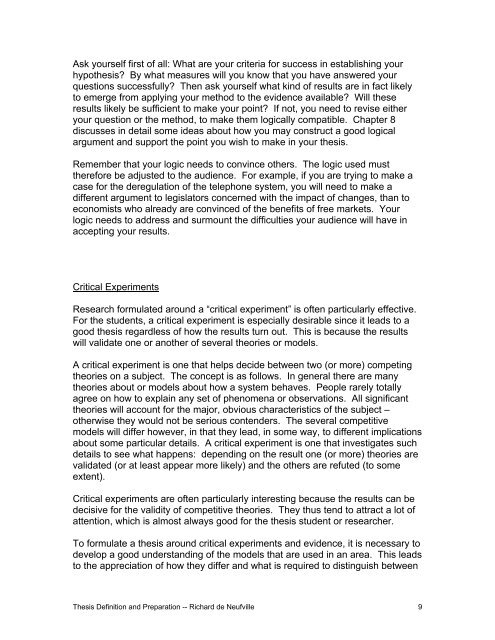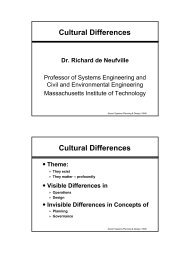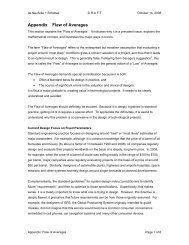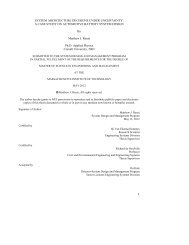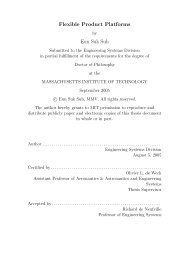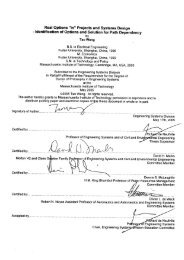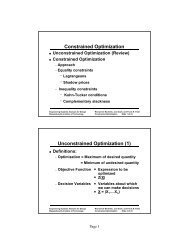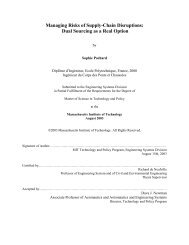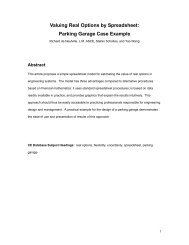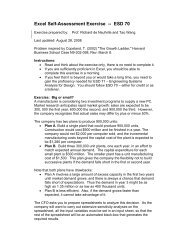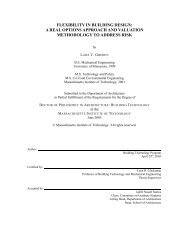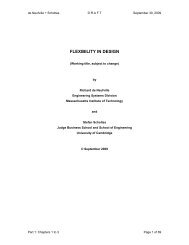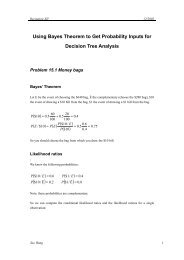Richard de Neufville's TPP SM Thesis Manual - Title Page - MIT
Richard de Neufville's TPP SM Thesis Manual - Title Page - MIT
Richard de Neufville's TPP SM Thesis Manual - Title Page - MIT
- No tags were found...
You also want an ePaper? Increase the reach of your titles
YUMPU automatically turns print PDFs into web optimized ePapers that Google loves.
Ask yourself first of all: What are your criteria for success in establishing yourhypothesis? By what measures will you know that you have answered yourquestions successfully? Then ask yourself what kind of results are in fact likelyto emerge from applying your method to the evi<strong>de</strong>nce available? Will theseresults likely be sufficient to make your point? If not, you need to revise eitheryour question or the method, to make them logically compatible. Chapter 8discusses in <strong>de</strong>tail some i<strong>de</strong>as about how you may construct a good logicalargument and support the point you wish to make in your thesis.Remember that your logic needs to convince others. The logic used musttherefore be adjusted to the audience. For example, if you are trying to make acase for the <strong>de</strong>regulation of the telephone system, you will need to make adifferent argument to legislators concerned with the impact of changes, than toeconomists who already are convinced of the benefits of free markets. Yourlogic needs to address and surmount the difficulties your audience will have inaccepting your results.Critical ExperimentsResearch formulated around a “critical experiment” is often particularly effective.For the stu<strong>de</strong>nts, a critical experiment is especially <strong>de</strong>sirable since it leads to agood thesis regardless of how the results turn out. This is because the resultswill validate one or another of several theories or mo<strong>de</strong>ls.A critical experiment is one that helps <strong>de</strong>ci<strong>de</strong> between two (or more) competingtheories on a subject. The concept is as follows. In general there are manytheories about or mo<strong>de</strong>ls about how a system behaves. People rarely totallyagree on how to explain any set of phenomena or observations. All significanttheories will account for the major, obvious characteristics of the subject –otherwise they would not be serious conten<strong>de</strong>rs. The several competitivemo<strong>de</strong>ls will differ however, in that they lead, in some way, to different implicationsabout some particular <strong>de</strong>tails. A critical experiment is one that investigates such<strong>de</strong>tails to see what happens: <strong>de</strong>pending on the result one (or more) theories arevalidated (or at least appear more likely) and the others are refuted (to someextent).Critical experiments are often particularly interesting because the results can be<strong>de</strong>cisive for the validity of competitive theories. They thus tend to attract a lot ofattention, which is almost always good for the thesis stu<strong>de</strong>nt or researcher.To formulate a thesis around critical experiments and evi<strong>de</strong>nce, it is necessary to<strong>de</strong>velop a good un<strong>de</strong>rstanding of the mo<strong>de</strong>ls that are used in an area. This leadsto the appreciation of how they differ and what is required to distinguish between<strong>Thesis</strong> Definition and Preparation -- <strong>Richard</strong> <strong>de</strong> Neufville 9


